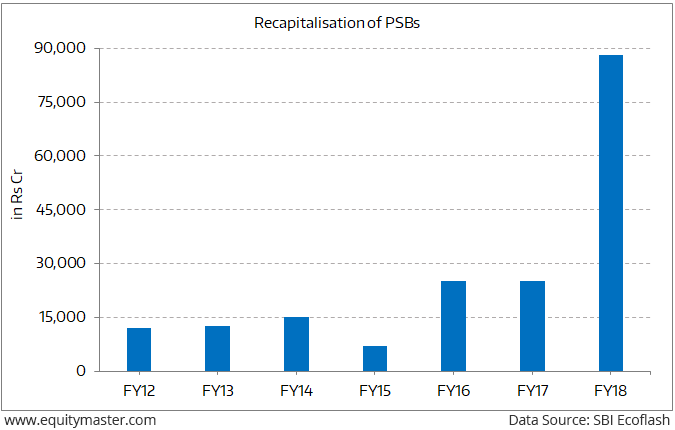- Home
- Todays Market
- Indian Stock Market News January 9, 2019
Sensex Closes 232 Points Higher; Realty & Bank Stocks Outperform Wed, 9 Jan Closing
Indian share markets bounced back into the green after briefly slipping in the negative territory in late afternoon deals. At the closing bell, BSE Sensex ended up by 232 points, while, NSE Nifty ended up by 53 points.
Barring metal stocks, oil & gas stocks and power stocks, all sectoral indices ended in green with realty stocks and bank stocks witnessing maximum buying interest.
Globally, Asian stock markets finished broadly higher today with shares in Hong Kong leading the region. The Hang Seng is up 2.3% while Japan's Nikkei 225 is up 1.1% and China's Shanghai Composite is up 0.7%. European markets are broadly higher today with shares in Germany leading the region. The DAX is up 1% while France's CAC 40 is up 1% and London's FTSE 100 is up 0.6%.
Pharma stocks ended the day on a mixed note with Strides Pharma Science & Piramal Enterprises leading the pack of gainers. As per an article in a leading financial daily, Lupin is recalling over 23,000 bottles of an antibiotic drug in the US for being sub-potent, US Food and Drug Administration (USFDA) said.
As per the latest Enforcement Report issued by the USFDA, Lupin Somerset is recalling 23,460 bottles of Nitrofurantoin oral suspension which is used to treat or prevent certain bladder infections.
Reportedly, the drug is manufactured by Novel Laboratories Inc for Baltimore-based Lupin Pharmaceuticals, Inc.
The ongoing, voluntary recall is a class II recall, the reports noted.
As per USFDA, a class II recall is initiated in a situation in which use of, or exposure to, a violative product may cause temporary or medically reversible adverse health consequences or where the probability of serious adverse health consequences is remote.
To know more about the company, you can access to Lupin's Q2FY19 result analysis and Lupin's 2017-18 Annual Report Analysis on our website.
Lupin share price ended the day down by 0.4%.
Moving on to the news from the economy. As per the rating agency ICRA, the government's decision to infuse additional Rs 410 billion into cash-starved public sector banks (PSBs) for the financial year 2019 is optimistic for the lenders as it will assist them lower their losses on dud loans.
It noted that the government had sought Parliament's approval for infusion of an additional Rs 410 billion, taking the total fund infusion to Rs 1.1 trillion in FY19.
It added that with this round, the overall capital infusion into state-run banks during FY15-FY19 stands at Rs 2.6 trillion.
According to the report, the current round of recapitalisation would enhance the lending capacity of these banks and help them come out of the Reserve Bank's prompt corrective action (PCA) framework.
It also pointed out that of the 21 state-owned banks, as many as 11 are under the PCA framework, which imposes lending restrictions on weak banks. It stated that after the merger of Dena Bank and Vijaya Bank with Bank of Baroda (BoB), the number of state-run banks will come down to 19.
Further, as a part of capital allocation plan for FY19, recently some state-run lenders have been allocated a relatively higher quantum of capital.
ICRA further said that this capital will enable lenders to reduce their net non-performing advances below the PCA threshold of 6% as well as achieving regulatory capital ratios (including capital conservation buffer of 1.875% required as of March 2019).
Notwithstanding a higher share of capital allocation to some state-owned banks under the PCA, the agency expects capital allocation to other banks under PCA to be limited to enable them to meet the regulatory minimum capital ratios, 7% of tier 1 and 9% of CRAR.
Despite additional capital infusion, it expects most of these banks currently under the PCA to report second consecutive year of losses in FY19.
However, we at Equitymaster believe, using recapitalisation bonds can only act as a short-term measure to the crisis afflicting Indian public sector banks today. Such a measure will not address the structural issue in the banking system, i.e. the poor standard of lending and poor governance system.
Recapitalisation of PSBs Over the Years
Our big picture editor, Vivek Kaul, talks about moral hazard risk arising out of recapitalization. He writes:
- "If the government bails them around this time around, the banks know that they can count on the government bailing them out the next time around as well. And this means that they can follow fairly loose standards of lending, in order to lend money quickly."
To know what's moving the Indian stock markets today, check out the most recent share market updates here.
For information on how to pick stocks that have the potential to deliver big returns, download our special report now!
Read the latest Market Commentary



Equitymaster requests your view! Post a comment on "Sensex Closes 232 Points Higher; Realty & Bank Stocks Outperform". Click here!
Comments are moderated by Equitymaster, in accordance with the Terms of Use, and may not appear
on this article until they have been reviewed and deemed appropriate for posting.
In the meantime, you may want to share this article with your friends!